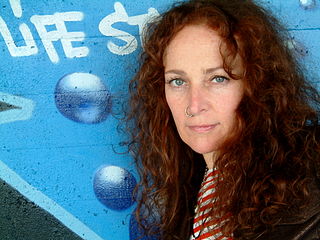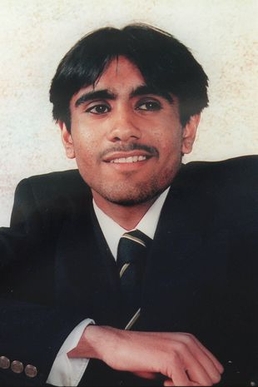Related Research Articles
McDonald's Corporation v Steel & Morris[1997] EWHC 366 (QB), known as "the McLibel case", was an English lawsuit for libel filed by McDonald's Corporation against environmental activists Helen Steel and David Morris over a factsheet critical of the company. Each of two hearings in English courts found some of the leaflet's contested claims to be libellous and others to be true.

Stephen Lawrence was a black British teenager from Plumstead, southeast London, who was murdered in a racially motivated attack while waiting for a bus in Well Hall Road, Eltham, on the evening of 22 April 1993, when he was 18 years old. The case became a cause célèbre: its fallout included changes of attitudes on racism and the police, and to the law and police practice. It also led to the partial revocation of the rule against double jeopardy. Two of the perpetrators were convicted of murder on 3 January 2012.

Helen Steel is an environmental and social justice activist who is known for her involvement in the McLibel case, an English lawsuit for libel filed by McDonald's Corporation that lasted for 10 years and was eventually taken to the European Court of Human Rights, where Steel and fellow campaigner David Morris won their case against the UK Government on the grounds that they had been denied a fair trial. She is a key figure in the 'Spycops' scandal and subsequent Undercover Policing Inquiry.

Clement Blair Peach was a New Zealand teacher who was killed during an anti-racism demonstration in Southall, London, England. A campaigner and activist against the far right, in April 1979 Peach took part in an Anti-Nazi League demonstration in Southall against a National Front election meeting in the town hall and was hit on the head, probably by a member of the Special Patrol Group (SPG), a specialist unit within the Metropolitan Police Service. He died in hospital that night.
London Greenpeace was an anarchist environmentalist activist collective that existed between 1972 and 2001. They were based in London, and came to international prominence when two of their activists refused to capitulate to McDonald's in the landmark libel case known as "McLibel". It was not affiliated with Greenpeace International nor with Greenpeace UK.
Covert policing in the United Kingdom is employed to enable an officer of the British police to gather intelligence from and about suspects without alerting them that they are under observation.
The Movement for Justice was set up in 1995 by people around the Kingsway College Student Union in the London Borough of Camden to tackle racism in institutional and established forms. The group confronted organised fascism as well as death in custody and wider racism to black people as well as travellers, refugees and asylum seekers. It is also the sister group to the American organization The Coalition to Defend Affirmative Action, Integration & Immigrant Rights, and Fight for Equality By Any Means Necessary (BAMN).
The National Public Order Intelligence Unit (NPOIU) was run by the Association of Chief Police Officers (ACPO), a private company connected to United Kingdom police intelligence, and was set up in 1999 to track green activists and public demonstrations. It has been found that much of the Unit's work was against "activists working on social justice, anti-racist, and environmental campaigns" and legitimate dissent, rather than extremist groups, with more than 1,000 political groups having been subjected to surveillance by covert officers. The work of the group has been accused as having hobbled Climate-related protest in the late 2000s in the United Kingdom and more widely.

The 2009 G20 London summit protests occurred in the days around the 2 April 2009 G20 London summit. The summit was the focus of protests from a number of groups over various long-standing and topical issues. These ranged from disquiet over economic policy, anger at the banking system and bankers' remuneration and bonuses, the continued war on terror and concerns over climate change.
The history of the Metropolitan Police in London is long and complex, with many different events taking place between its inception in 1829 and the present day.
The National Domestic Extremism Team was a police unit set up in 2005 within the association of chief police officers to provide a dedicated response to tackling extremism. It co-ordinated operations and investigations nationally, working closely in England and Wales with the Crown Prosecution Service which had a complementary network of prosecutors with specialist expertise in domestic extremism.
Mark Kennedy, undercover name Mark Stone, is a former London Metropolitan Police officer who, whilst attached to the police service's National Public Order Intelligence Unit, (NPOIU) infiltrated many protest groups between 2003 and 2010 before he was unmasked by political activists as an undercover policeman on 21 October 2010 and his identity was confirmed by the media three days later. During his time under cover he manipulated and deceived several women into having sexual relationships with him with the knowledge of his superiors. An Investigatory Powers Tribunal found his actions to be an "abuse of the highest order" and had "grossly debased, degraded and humiliated" one of his victims.
The National Domestic Extremism and Disorder Intelligence Unit is a national police unit of the National Police Chiefs' Council within the Metropolitan Police Service Specialist Operations Group.
Robert Lambert MBE is a British academic and former undercover police officer. He served in the controversial Special Demonstration Squad and posed as a left-wing animal rights activist from 1983 to 1988, fathering a child with an activist, who was unaware of his true identity, during his deployment. Both the woman and her child have needed psychiatric treatment as a result, and both have been awarded damages against the Police.

Louise Wallis is a DJ, singer, and writer who is also known for her animal advocacy. She lived in London, England, and now resides in South Wales.

Undercover: The True Story of Britain's Secret Police is a 2012 book by The Guardian journalists Rob Evans and Paul Lewis.
Around the end of 2010 and during 2011, it was disclosed in UK media that a number of undercover police officers had, as part of their 'false persona', entered into intimate relationships with members of targeted groups and in some cases proposed marriage or fathered children with protesters who were unaware their partner was a police officer in a role as part of their official duties. Various legal actions followed, including eight women who took action against the Metropolitan Police and the Association of Chief Police Officers (ACPO), stating they were deceived into long-term intimate relationships by five officers, including Mark Kennedy, the first officer to be identified as such, who was publicly identified on 21 October 2010 as infiltrating social and environmental justice campaigns, and Mark Kennedy himself who claimed in turn that he had been incompetently handled by his superiors and denied psychological counselling. According to The Guardian, Kennedy sued the police for ruining his life and failing to "protect" him from falling in love with one of the environmental activists whose movement he infiltrated.

The Undercover Policing Inquiry is an independent statutory inquiry into undercover policing in England and Wales. It was announced by Theresa May, the then Home Secretary, on 6 March 2014, and its terms of reference were published on 16 July 2015. The Inquiry has been chaired by Sir John Mitting since July 2017, following the resignation due to ill-health of Sir Christopher Pitchford.
The Monitoring Group (TMG) is an anti-racist charity in the UK. It was established in Southall in the early 1980s, and originally known as the Southall Monitoring Group. Its director is Suresh Grover.

Lakhvinder "Ricky" Reel, a 20-year-old British man, died in October 1997 in London, United Kingdom. He was last seen alive in the early morning of 15 October and on 21 October his body was recovered from the River Thames near Down Hall Road, in the town centre of Kingston upon Thames.
References
- 1 2 3 Evans, Rob (12 November 2020). "Nine Met officers spied on public anti-war meeting in 1968, inquiry hears". The Guardian . Retrieved 12 November 2020.
- ↑ "Anti-Vietnam War Protest". Friends of the Metropolitan Police Historical Collection. Archived from the original on 20 March 2012. Retrieved 12 July 2013.
- ↑ Lewis, Paul; Evans, Rob (20 December 2011). "Undercover operations 'totally outside the bounds of a civilised society' – lawyer". The Guardian . Retrieved 12 July 2013.
- ↑ Lewis, Paul; Evans, Rob (19 December 2011). "Former girlfriends of undercover policemen appear to stand good chance of winning". The Guardian . Retrieved 12 July 2013.
- ↑ Lewis, Paul; Evans, Rob (7 June 2011). "Mark Kennedy case: CPS accused of suppressing key evidence". The Guardian . Retrieved 12 July 2013.
- ↑ Lewis, Paul; Evans, Rob (17 May 2013). "Police spies' use of dead children's identities was common, MPs told". The Guardian . Retrieved 12 July 2013.
- 1 2 Harrison, Brian (2009). Seeking a Role: The United Kingdom 1951–1970. Oxford: Oxford University Press. ISBN 978-0-198-20476-3.
- ↑ Creedon, Mick (July 2013). Operation Herne - Report 1: Use of covert identities (PDF). Metropolitan Police Service . Retrieved 24 October 2014.
- ↑ Bloom, Clive (2012). Riot City: Protest and Rebellion in the Capital. Basingstoke: Palgrave Macmillan. p. 45. ISBN 978-1-137-02935-5.
- ↑ Taylor, Stephen (March 2015). Investigation into links between Special Demonstration Squad and Home Office (PDF). Home Office. p. 6. Retrieved 12 March 2015.
- ↑ Evans, Rob (9 November 2020). "Undercover officer rekindled relationship seven years later, inquiry told". TheGuardian.com .
- ↑ Lewis, Paul; Evans, Rob (3 February 2013). "Police spies stole identities of dead children". The Guardian . Retrieved 12 July 2013.
- ↑ Lewis, Paul; Evans, Rob (24 June 2013). "Police 'smear' campaign targeted Stephen Lawrence's friends and family". The Guardian . Retrieved 12 July 2013.
- ↑ Evans, Rob; Lewis, Paul (22 June 2013). "Undercover policemen, undercover lovers". The Guardian . Retrieved 29 August 2014.
- ↑ Lewis, Paul; Evans, Rob (24 June 2013). "Stephen Lawrence's father demands judicial inquiry into police spying". The Guardian . Retrieved 25 June 2013.
- ↑ Lewis, Paul; Evans, Rob; Pollak, Sorcha (24 June 2013). "Trauma of spy's girlfriend: 'like being raped by the state'". The Guardian . Retrieved 25 June 2013.
- 1 2 Kelly, June; Casciani, Dominic (23 October 2014). "Met pays £425,000 to mother of undercover policeman's child". BBC News . Retrieved 23 October 2014.
- ↑ Evans, Rob (14 December 2018). "High court dismisses woman's attempt to prosecute police spy". The Guardian. Retrieved 14 December 2018.
- ↑ Farrell, Paul; Evans, Rob (9 March 2016). "Undercover UK police spy apologises after being tracked down by woman he deceived". The Guardian .
- ↑ "Home". Undercover Policing Inquiry. Retrieved 31 March 2016.
- ↑ Watts, Rob, 1948-.... (2020). Criminalizing dissent : the liberal state and the problem of legitimacy. Routledge. ISBN 978-1-351-03957-4. OCLC 1122828954.
{{cite book}}: CS1 maint: multiple names: authors list (link) CS1 maint: numeric names: authors list (link) - ↑ Evans, Rob; Dodd, Vikram; Lewis, Paul (28 October 2020). "Police spying inquiry to examine targeting of UK black justice groups". The Guardian. Retrieved 12 November 2020.
- ↑ "Spanner Films press release". 7 March 2014. Retrieved 13 March 2014.
- ↑ McKay, Alastair. "Undercover". BBC Online . Retrieved 10 April 2020.